
“I think the training went great. You provided a lot of good information that we need.”
.... Now Enrolling for Fall 2025 – Save 10% with code CAREER
Join a global network of addiction and mental health professionals trained in over 40 countries and get everything you need to build a purpose-driven practice, help others heal, and create a profitable business
Fully accredited. Globally recognized. Built for the next generation of certified counselors.

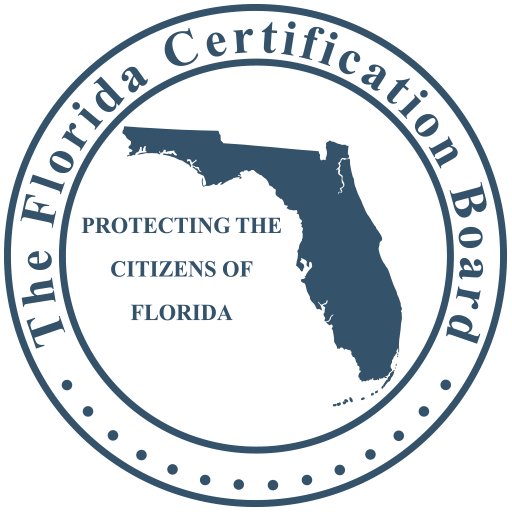


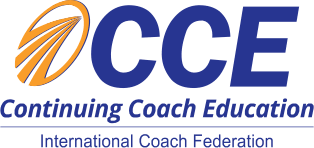




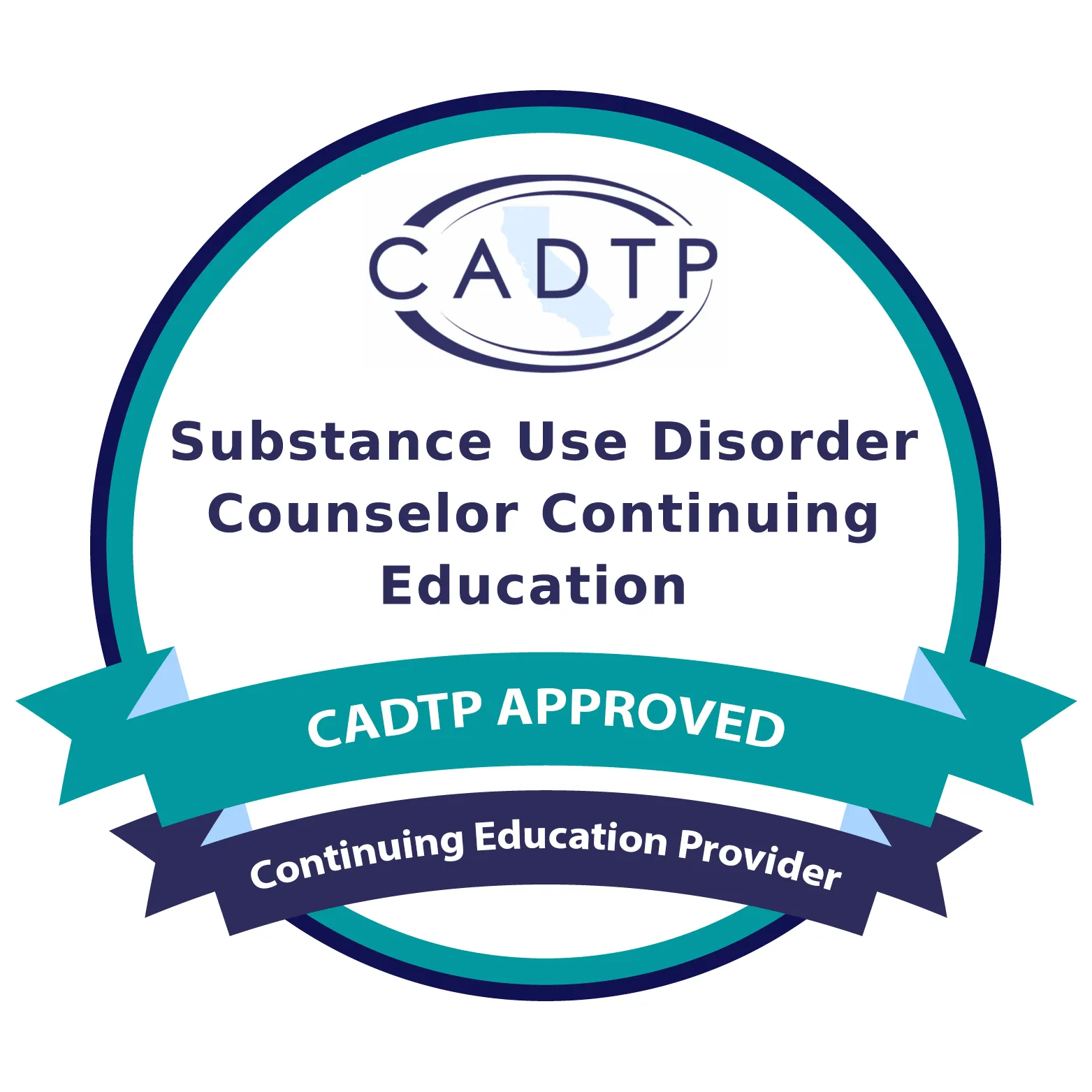


This industry-recognized training program prepares you to become a Certified Addictions Counselor—capable of supporting individuals, families, and communities impacted by substance use disorders. Through fully self-paced online modules, instructor-led guidance, and a globally recognized curriculum, you'll build the foundational knowledge and applied skills required to work in professional treatment and recovery settings.
From day one, you'll begin learning how to assess, counsel, document, and ethically support clients through every phase of the recovery process—whether in a treatment center, private practice, or community agency.
Our core training framework aligns with IC&RC standards and includes education in 10 key domains such as Treatment Planning, Clinical Evaluation, Documentation, Counseling Theories and Techniques, Case Management, Cultural Competency, Ethics, and more.
Learn 100% online, from anywhere in the world, on a schedule that works for you. Most students complete the full program in 3–10 months and begin fulfilling practicum hours or applying for job placement immediately after graduation.

Work in treatment settings
Serve clients in residential, outpatient, and community-based programs. Certified counselors are essential staff in facilities across the U.S., Canada, and internationally.

Join a clinical care team
Collaborate with therapists, social workers, case managers, and medical professionals to support clients through every stage of recovery.
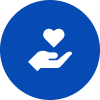
Pursue private or nonprofit opportunities
Use your certification to work in nonprofits, corrections, community outreach, employee assistance programs, or your own private counseling practice (as allowed by your state or board).
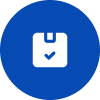
Fulfill a high-demand role
With the opioid crisis and growing mental health needs, certified professionals are in urgent demand. This program prepares you for the real-world roles where you’ll be needed most.
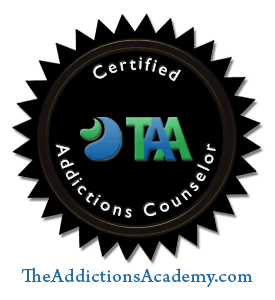
Becoming a Certified Addictions Counselor is a clear, step-by-step pathway
Enroll in the program and access your courses. Choose full-pay for immediate access or monthly for a structured pace.
Complete your training and practicum hours (if required by your local board). You’ll graduate with 445 hours of board-approved education across 10 domains.
Submit your application packet to your state, provincial, or national board, including your certificates and field-hour documentation.
Sit for your exam(s) — both local and international IC&RC options are available. Once you pass, you are fully certified to practice.
This structure ensures you’re never left guessing. From day one, you’ll know exactly how to move from student to certified professional.
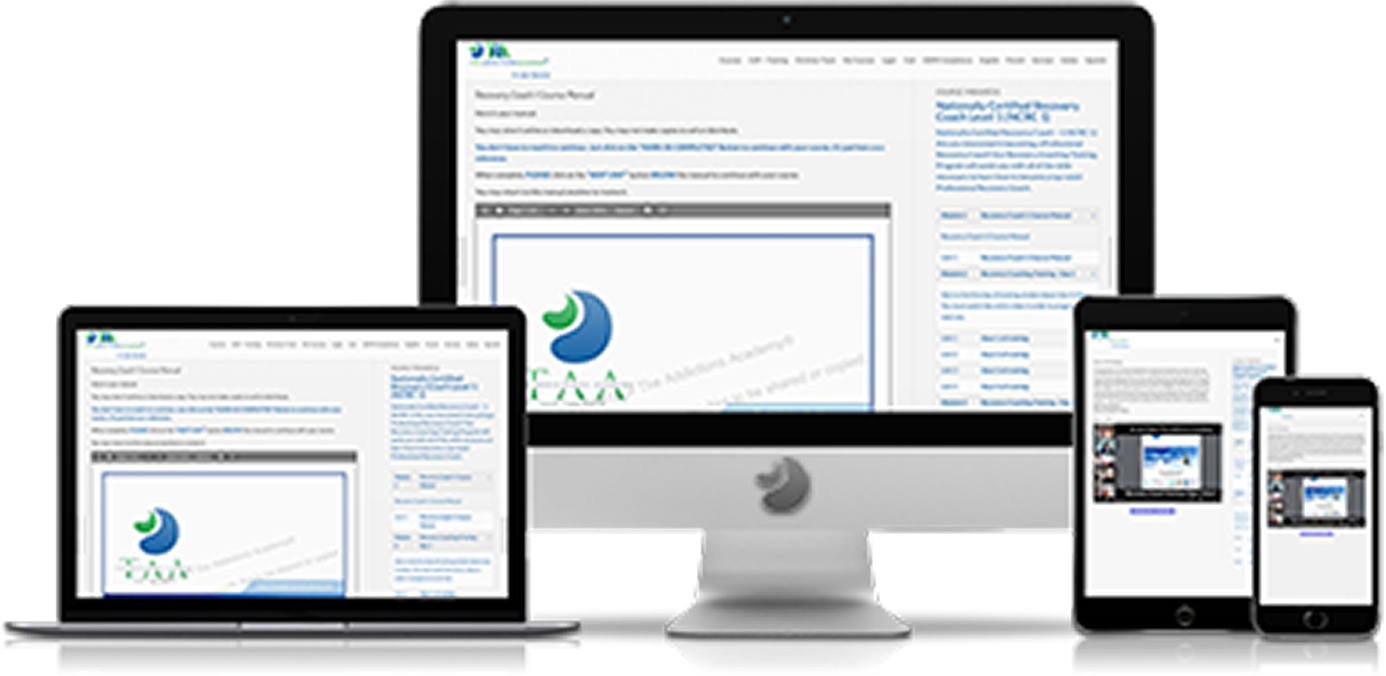

• Overview of addiction and treatment/history
• Understand and apply The Disease of Addiction and treatment options and modalities (overview)
• Understand Etiology/Causation of Addiction and dependence liability
• Involvement and Treatment of Family in Recovery
• Understanding Other Substances and Behavioral Addictions
• Understand and apply Differentiation between Tolerance vs. Dependence markers
• Understand and apply basic pharmacology principles
• Understanding the Relationship of Addiction to Health, Crime, and Other Social Problems
• Understanding additional Treatment Components
• Use of Support Groups
• Understanding how human development and cognitive abilities form and relevancy to addiction
• Understanding when addiction treatment protocols are necessary
• Understand Dual or Triple Diagnoses (mental illness, HIV, mental disability)
• Gain Knowledge of History of Addiction and/or Addiction Treatment
• Apply the Models of Treatment/Evidence Based Progress
• Pharmacology and Physiology (including alcohol) 45 hours specific
• Learn Psychoactive drugs, toxic and therapeutic effects/uses
• To gain knowledge in the Physical Aspects of Addiction, Brain Science
• Signs, Symptoms, Progression of Addiction
• Types of Service Modalities (residential, outpatient, etc.)
• Understanding human development theories: Lifespan, Role Theory, Self-Actualization, Self in Relations, Attachment Theory, etc.
• Understanding Nature vs. Nurture Concepts
• Utilizing Assessment Tools, Assessing Treatment Signs and Progress
• Utilizing Client Screening Tools (those currently in use)
• Understanding Client Intake Procedures
• Understanding and Utilizing Discharge or Transfer Summaries
• Creating Proper Clinical Documentation
• Understanding Electronic Health Records/Technology
• Understanding Privacy & Confidentiality
• Creating and Generating Progress Notes
• Understanding how to engage clients in the treatment process
• Creating Psychosocial Summaries
• Reports/Record Keeping/Records Management
• Client Progress Assessment and Response
• Developing Counseling Theories/Techniques
• Creating a Therapeutic Relationship with the client
• Demonstrating Active and Empathetic Listening Skillset
• Demonstrating Mirroring, Reflecting Listening, and Paraphrasing situations with the client (oral presentation/role play)
• Developing a Therapeutic Alliance with the client in 5 steps
• Applying Evidence-based Practices
• Understand the relevance of Individual/Group/Family Counseling
• Understanding Transference, Counter Transference
• Demonstrating Motivational Interviewing Techniques and 3 effective questioning techniques (oral presentation/role play)
• Demonstrating Communication Styles; Challenging, clarification, Reflection (role play)
• Types of Treatment Programs/Levels of Treatment
• Create and Understand Group Intervention
• Knowledge of Counseling Theory versus Counseling Practice
• Understanding Group Therapy Dynamics
• Creating Counseling Techniques in group settings
• Application of Life Skills and implementation of problem-solving techniques in Group settings
• Establishing a therapeutic relationship setting
• Creating Safe Space in a Group
• Creating and Demonstrating life skills in Group Techniques
• Understanding Group Intervention Techniques
• Understanding Counseling Theory
• Understating the differences between educational, psycho-educational, therapeutic, and self-help groups
• Creation of group curriculum
• Care for the Caregiver/Self Care
• Understanding Burnout and personal wellness
• Understanding your limitations as a counselor
• Understanding burnout and compassion fatigue
• Demonstrating Crisis Intervention/Verbal De-escalation
• Understanding Ethics and Ethical Decision-making
• Understanding Differences between Individual, Group, and Family Counseling Techniques (role play)
• Understanding Laws Governing Privacy, Confidentiality, and HIPAA
• Understanding Management and Leadership Skills
• Understanding Medication-Assisted Treatment
• Understanding Models of Treatment
• Demonstration of Observation and Communication Skills (role play)
• Understanding Rules and Regulations that Govern Full Continuum of Services and Referrals
• Demonstrating Knowledge of Special Population Needs/Cultural Competence
• Demonstrating Supervision Techniques (role play)
• Understanding Research/Translating Research to Practice
• Understanding Wellness, Alternative Therapies, Nutrition
• Care Coordination
• Demonstration of Motivational Interviewing Techniques
• Demonstration of Trauma-Informed Care Approach
• Understanding Correct Client Placement Criteria
• Developing Individualized Treatment Plans
• Understanding Drug Court/Correction-based Treatment/Policy/Theory
• Enhancing Client Choice/Client-Directed Care
• Utilizing Evidence-Based Practice (EBP) Treatment Protocols
• Understanding Youth/Adolescent needs
• Understanding the needs of Women, LGBTQIA+, Indigenous Populations, Geriatric, High-Risk populations
• Creating the proper Intake/Orientation to Treatment
• Understanding Medication-assisted Treatment
• Creating On-going Assessment
• Overcoming Barriers to Treatment Progress
• Understanding Special Population Needs: corrections, prison/parole/probation, HIV/Aids
• Understanding Mental health, dual diagnosis/co-occurring disorders
• Creating Stages of Change and Treatment Goals/Interventions
• Following Treatment Goals and Measuring Success
• Treatment Planning/Models of Treatment
• Demonstrate how to assess drug and alcohol addiction
• Understanding the Tools of Assessment
• Understand Addiction & Human Growth/Development
• Demonstrate the Addictive Process and Readiness to Change Scale
• Understanding Client Orientation
• Knowledge and use of Client Assessment and Screening Tools
• Assessment Instruments, Procedures, and Techniques
• Creating and Demonstrating Client Engagement
• Understand how to Client Match to Service Array
• Understanding Detoxification Protocols
• Ability to Utilize DSM-5/Diagnosis Criteria / ASAM
• Understanding Motivational Interviewing
• Other Substance & Behavioral Addictions – Gambling/Smoking/Food
• Assessing Readiness and Motivation for Treatment
• Understanding and Applying Risk Factors/Risk Assessment/Risk Management
• Applying Screening Instruments, Procedures, and Techniques
• Utilizing Screening/Assessment for Dual Diagnosis/Co-Occurring Disorders
• Understanding Signs/Symptoms/Stages of SUD, Active Use and Withdrawal
• Urinalysis and Other Biological Assessments
• Understanding and Applying Adult Learning Theory
• Knowledge of Anger Management Skills
• Creating Client Education and Family Goal Setting
• Changing Criminal Behavior/Criminal Thinking Errors/Offender Treatment
• Understanding Co-Dependency and Moral Development
• Understanding Cultural Diversity/Special Populations
• Understanding Domestic Violence
• Understanding Family Dynamics and effects of addiction on various family roles
• Knowledge of self-help groups, educational, psychoeducational, and therapeutic groups, and demonstration of each
• Knowledge of HIV/TB/Hepatitis C
• Understanding family roles and family interventions
• Demonstrating Application of Life Skills
• Knowledge of family counseling techniques
• Understanding and Demonstrating Theories of Counseling Techniques in the Family vs. Group and Individual
• Understanding Victim vs. Perpetrator Counseling
• Toxicology
• Understanding Boundaries / Transference
• Knowledge of Computer Ethics and online record keeping CRMS
• Understanding Cultural Competence, supervision, and professional development
• Understanding and Application of Ethical Decision Making / Code of Ethics
• Application of Laws / Rules & Regulations, including legal issues and correct reporting techniques
• Understanding Organizational Ethics
• Understanding Policy in Human Services
• Demonstration of consent versus negligence
• Record keeping in terms of legal and ethical necessities
• Understanding and Demonstration of Privacy / Confidentiality / HIPAA/Disclosure
• Understanding Relationships / Dual Relationships
• Understanding Sexual Misconduct
• Understanding client welfare is a primary concern
• Demonstrating Boundaries in the Therapeutic Relationship
• Understanding the relationship between referral sources and outside sources, counselors, and organizations
• Understanding the sensitive nature of financial issues of the client
• Understanding Telehealth
• Understanding client portals and EMR systems
• Understanding HIPAA compliant software programs
• Knowledge of Covid 19 Exceptions, considerations, and new models
• Understanding Limitations of Telehealth
• Creating Documentation for online sessions
• Knowledge of DEA guidelines for prescriptions
• Knowledge of SAMSHA Guidelines
• Knowledge of Medicaid and Private pay guidelines
• Demonstrating Correct reporting techniques
• Understanding Health Privacy Rules
• Facilitating Resources/links for more information
• Creating Advocacy/Liaison Activities
• Understanding Case Management Roles and Functions
• Creating Client Referrals and service platform coordination
• Creating Community Resources/Services
• Understanding Confidentiality/HIPPA Issues with Referrals
• Creating and Implementation of Consultation with other Professionals/ Self-help Groups
• Understanding Continuum of Care/Placement and aftercare follow up- follow-through
• Understanding and Utilizing Managed Care Systems
• Following the Referral Outcome/Evaluation
• Creating the proper Service/Care Coordination/Collaboration
• Understanding Special Population Needs

Stay connected, ask questions, and collaborate with certified counselors and instructors.

Use our official certification seals and logos for your website, LinkedIn, and social media.

Get exclusive student pricing on all additional certifications, classes, and bundles.

Tap into our national network for job leads, internship referrals, and professional connections.

Feature your profile in our counselor directory so clients and treatment centers can find you.

Become eligible to apply for client referrals and contract positions through The Addictions Academy.
We know every student’s goals and budget are different. That’s why we offer two options:
Full Enrollment (Best Value)
$4,497 one time
Get instant access to all 10 modules. Study at your own pace and finish in as little as 3–6 months. You’ll have a full 14 months of access to complete everything, and this option comes with a built-in tuition discount.
Monthly Module Track
$499 per month
Receive one course each month for 10 months. You’ll pay as you go, complete each module in order, and stay on track with structured pacing. To progress, you must pass all quizzes with a 70% or higher


No degree is required to begin your training with us. However, every state, province, or country has its own rules for certification and licensing. Some may require a college degree to sit for their local board exams, while others accept a high school diploma plus field hours. If you’re unsure, call us—we’ll walk you through your options based on your location.
Most students complete the entire 445-hour program in 3–6 months. You’ll have up to 14 full months of access to finish at your own pace, and we provide you with instant access when you pay in full. If you choose the 10-month payment plan, you’ll unlock one course per month and complete them step by step.
It depends on your local board requirements. Some locations require supervised practicum hours in addition to your education. Practicum is an additional cost since it is only required in a few states.
TAA 200: Supervised Practicum 45 hours
The course includes supervision by a qualified instructor and includes direct supervision. The instructor must also be available for consultation while the student is completing fieldwork requirements.
TAA 201: Supervised Fieldwork Practicum (Internship)
A minimum requirement of 255 hours of practical experiences performed at an agency approved by the aforementioned instructor. The student must complete all of the 12 Core functions at the internship site. Each core function requires a minimum of 21 hours of practicum. The application of knowledge and skills in a practice setting is essential to professional counseling. The fieldwork is the means by which students learn to apply and integrate acquired knowledge and values; and to refine skills that are taught in the classroom.
There are different levels of addiction counselors. You can become a Certified Addictions Counselor (CAC) or Certified Addictions Professional (CAP) or a Master Certified Addiction Professional (MCAP). You will need to check with your specific state.
Please Note: We expect you to conduct yourself in a professional and ethical manner, as you are studying to become a professional in the field of addiction counseling. Any unethical or illegal behavior will not be permitted and your courses will be revoked and your status revoked.
Graduates work in private practice, treatment centers, detox facilities, nonprofit recovery organizations, hospitals, courts, and more. Some become counselors within community programs, while others go on to open their own practice. We even have contractor opportunities through The Addictions Academy for qualified grads.
Yes. Our program is fully accredited and board-approved across all 10 required accreditation domains, which means your hours are valid in the U.S., EU, Canada, Japan, and over 25 other countries. We’re also an approved CORE Provider with state boards across the U.S.
Yes. Our program is structured to align with state and provincial board requirements. Each section of our course includes built-in exams that help reinforce what you’ve learned, track your progress, and ensure you’re applying the material correctly. By the end, you’ll have the knowledge and preparation needed to sit for your board exam with confidence.
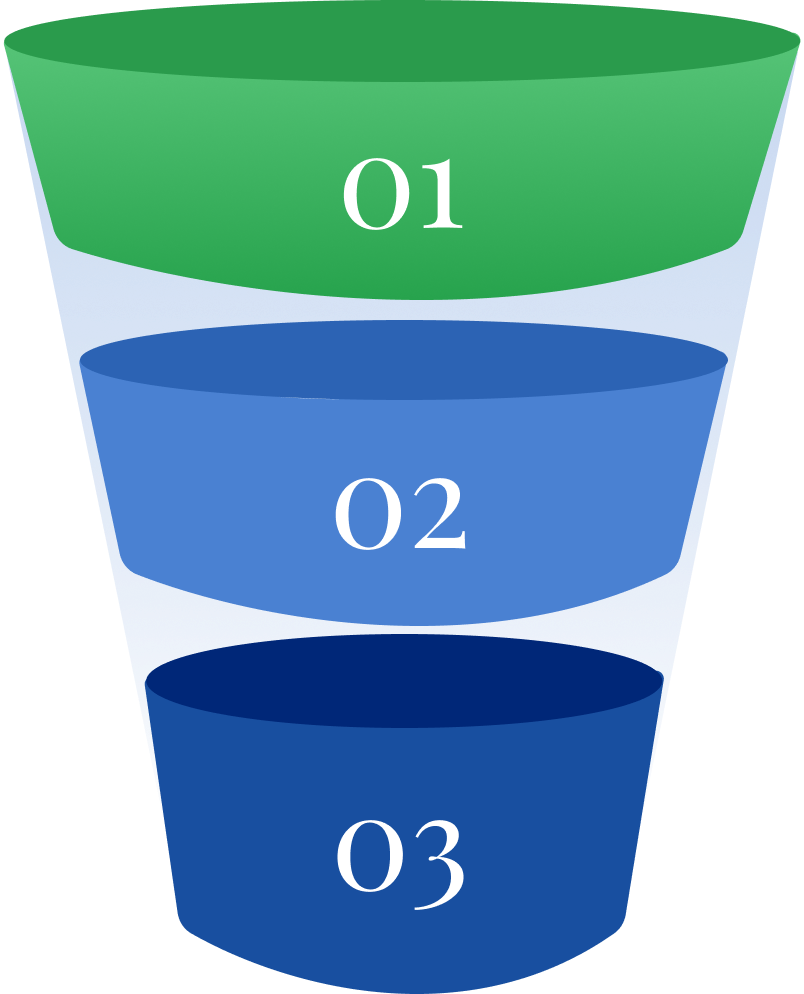

Dive deep into our accredited, board-approved training—online, at your own pace. Master the clinical knowledge, documentation skills, and counseling techniques required to become a certified addictions professional.

Use what you learn to complete practice assignments, prepare for certification exams, and (if needed) begin your supervised practicum or field hours. You’ll graduate with all the credentials needed to apply for national and international board exams.

Step confidently into your new career path as a Certified Addictions Counselor. Whether you pursue employment in a treatment center, agency, or private setting, you'll be ready to make a meaningful impact from day one.

The World’s Premier Training Institute for Mental Health & Addiction Professional Development.
2046 Treasure Coast Pkwy Unit A, #207 Vero Beach FL 32960